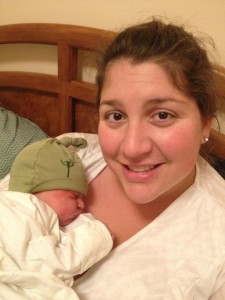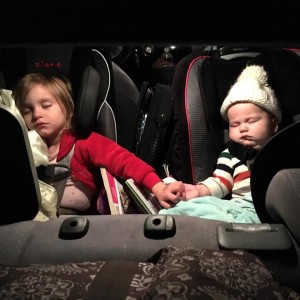
By Annie Walljasper
Parenting can be very reactionary… much of what we decide to do as parents seems to stem from our perception of what our parents did. From cycles of abuse to age old family traditions, both positive and negative childhood experiences influence our parenting philosophies.

I never really thought that I would co-sleep. It isn’t something my parents did with me, and I couldn’t see a way that it would allow my partner and I a place to come together as two people outside of parenthood. But when my first was born, she was demanding. She is my high-spirited little ball of energy who was awake the entire first day of her life. And after that, she woke like clockwork every hour and a half to two hours, ready to eat. If that challenge wasn’t enough, nursing was hard. Not just hard … Hard with a capital “H”.
There was a small nightlight on in our bedroom so that I could get up and get her from her basinet and feed her. I remember telling my husband about 2 weeks into my role as a new mom that that light was shining into my eyes so much, it felt as if my corneas were on fire. They were literally burning. He gently reminded me that the light could easily be turned off. Duh. And just like that, I had a realization.
Turn off the light. Bring the baby into bed. Nurse, snuggle, SLEEP. And we did. She was right where she wanted to be. I was right where I wanted to be. And sure we still woke up to eat all the time, but we were happy and it worked for us.
In our most recent podcast we talked with a woman who is not a “mom” in the traditional sense, but rather a daughter who has had the tables turn. She spends her days caring for her “Mama” – the woman who raised her, held her, fed and dressed her. And now, as mama nears the end of her life, she does the same. She spends time remembering the woman who gave everything for her and wanting to pay back to her the same care and compassion.
When we grow up, we think of the things we will do for our children. But as our parents grow older, how often do we think about how we will care for them? In a 2006 New Beginnings Magazine article, a woman named Dawn shares a story about her mother. Dawn was a surprise pregnancy, and she says her mother didn’t know much about caring for a baby. Their relationship was challenged – hugs and kisses and bonding didn’t seem to come naturally for her mom.
In her sixties, Dawn’s mother gets sick, and struggles to recover from several ailments. As she takes a turn for the worse, Dawn feels torn between what she thinks she’s supposed to do and what she wants to do. Despite feeling conflicted, she crawls in bed with her mom.
“I want so badly to crawl in bed with my mom. I don’t know if I want her to hold me or me to hold her.”
– Dawn Bower
Her mother makes it through another night and even seems to enjoy it, taking comfort in that closeness. In her last days, her children were by her side, in her bed. Dawn writes, “We hold her and stroke her hair, face, and arms, and legs. We do the things that I have always done to comfort my children when they need attention and love.” The comfort they might have been looking for is eclipsed by the comfort they likely gave.

Now, I am not saying that co-sleeping is for everyone. What I am saying is that people at the beginning and the end of their lives are vulnerable. Children are constantly facing new emotions, new situations, and a whole lot of uncertainty. And as we begin to lose our physical and mental capabilities near the end of our lives, that uncertainty comes back, bringing with it raw, untethered emotions like when we were young. I am a fairly well-adjusted adult, and I want to be treated with respect and compassion. Shouldn’t the vulnerable among us get the same?
Everyone has to make the parenting choices that work for them. When making parenting choices we compare ourselves to our own parents, as well as others we see around us. We might want to do things differently than our parents, and that is OK. We may want to pass on cherished traditions. And in the end, we are all afraid of screwing up our kids.
We worry. Good grief, there is so much worry. But I think it comes down to treating our children the way we would like to be treated.
I ask myself, “How am I raising my daughter? What will she learn from my actions? How will it shape the parent … the partner … the citizen … she will be someday?”
And if I am lucky, she will care for me someday as well.